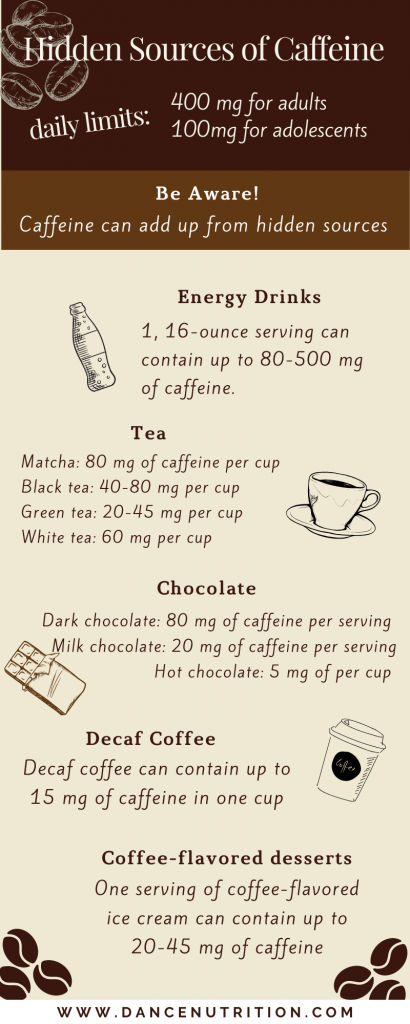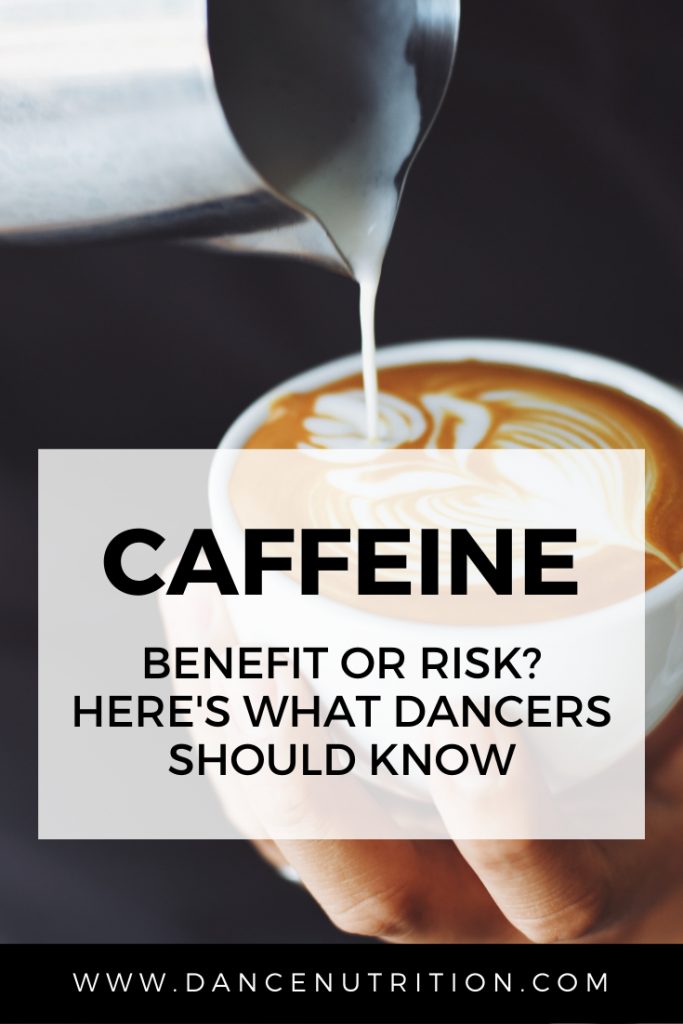There’s a lot of debate around the topic of caffeine. For a dancer, is it an ally or adversary? While some believe caffeine offers benefits like increased focus, its effects vary from dancer to dancer. Understanding the nuances of caffeine consumption is important not just for performance, but also, for safety. In this blog post, we’ll delve into what dancers need to consider regarding the effect of caffeine on their performance.
What exactly is caffeine?
Technically considered a drug, caffeine is a stimulant that acts on the brain and nervous system. It’s found naturally in foods like dark chocolate, and drinks like coffee and tea. Caffeine is also added to energy drinks and even some supplements.
How can caffeine impact my dancing?
From an athletic perspective, caffeine is an ergogenic aid— a substance used to enhance performance. It blocks adenosine, a neurotransmitter that when under normal conditions, tells your body it’s time to rest. When adenosine receptors are blocked, the body is “tricked” into feeling energized.
From improved mood and sharpened alertness to enhanced cognitive function, caffeine can feel like a boost, igniting your abilities in the studio and on stage. Caffeine can also heighten concentration, making you feel more focused and attentive in class. Research even supports caffeine’s ability to mobilize fat and spare muscle glycogen (quick reminder: glycogen is a readily available but limited fuel source for dancers). The sparing of glycogen enables muscles to work harder for longer periods, reducing your perceived level of effort. Think about your ability to hold a développé for longer!
Sounds exciting!
Not so fast. Despite these pros, caffeine has flaws. Excessive amounts increase your heart rate, leading to anxiety, and disrupted sleep patterns, all of which can hinder performance. This is why we recommend that dancers refrain from drinking caffeine 6 hours before going to bed.
Despite reducing your perceived level of effort while dancing, if you’re overdoing it or pushing through discomfort, your injury risk skyrockets. Neither coffee nor energy drinks are nutritive sources of energy and should not replace opportunities to fuel with balanced meals and snacks.
Coffee for Dancers: Ally or Adversary?
If you’re a dancer who needs your morning dose of caffeine or an afternoon pick-me-up, here are a few common questions to explore.
#1: How much caffeine is okay for a dancer?
It’s recommended that adults consume no more than 400 milligrams of caffeine daily. For teenagers 12-18 years old, no more than 100 milligrams per day. To give context, a single cup of coffee contains 75-100 milligrams of caffeine and decaffeinated coffee contains about 4 milligrams. Energy drinks contain up to four times this amount.
Every dancer has a unique sensitivity to caffeine. Some may thrive on multiple cups of coffee or tea before a performance, while others may find it too stimulating. Generally, I support a maximum of 1-2 cups of coffee (2-4 cups of caffeinated tea) daily.
Keep in mind that caffeine from various sources adds up. Soda, chocolate, and energy drinks are all sources to assess when calculating your consumption. Since establishments like Starbucks offer large sizes, consider the size of your cup (it may be larger than 8 ounces!) If you’re feeling extra jittery and having difficulty sleeping, you might need to reassess.
#2: Might I be addicted to caffeine?
Caffeine isn’t technically “addicting” and in moderate amounts, is considered generally safe. For those who drink caffeine regularly, however, a tolerance can build and symptoms like irritability, headaches, fatigue, and agitation can happen if the need isn’t met.
#3: Will caffeine stunt my growth?
Not necessarily, but excess amounts of caffeine (800 mg daily or more) can result in urine calcium losses—limiting the availability of calcium for your bones. A meal plan that is adequate in foods rich in calcium and vitamin D is always a plus for dancers. Here’s an article that offers strategies to support your bone health.
#4: Will it dehydrate me?
Though once believed to be a diuretic, caffeinated beverages don’t inherently dehydrate us. There is a mild diuretic effect, but not enough to cause dehydration. A bonus? Drinking coffee or tea counts towards your overall fluid intake, but remember to cap your caffeine intake for the reasons above. And since dancers need more than 1-2 cups of fluids each day, caffeinated beverages should be your only drink of choice.
Energy Drinks: Are they off-limits for dancers?
While I hesitate to label any meal or snack choice as “off limits,” dancers should understand why energy drinks aren’t preferable. Energy drinks typically contain high levels of caffeine and other stimulants like guarana and taurine. As with too much coffee, excessive amounts can lead to jitteriness and an increased heart rate. In addition to this, the stimulating effect could mask a larger need for refueling efforts.
Sugar (or lack thereof) is another consideration. Most sugar-free energy drinks contain sugar alcohol— a leading contributor to gas and stomach discomfort. For those drinks that contain sugar, unless paired with an otherwise balanced meal, a rapid energy boost will likely be followed by a subsequent crash.
Now let’s discuss safety. Technically considered a dietary supplement, energy drinks aren’t well-regulated. This means that the back-of-the-package label might not be accurate (learn more about supplements here). Long-term dependency on energy drinks has been associated with various health risks, and dancers with underlying health conditions or sensitivities to caffeine should be cautious when consuming energy drinks.
Key Takeaways
A moderate amount of caffeine (such as that found in 1-2 cups of coffee daily) can benefit a dancer’s performance. But don’t overdo it. The maximum effect of caffeine usually occurs after 30 minutes from ingestion and can last in your blood for 4-6 hours.
Instead of relying solely on caffeine for a boost, explore alternative strategies. Prioritizing adequate sleep, nutrition, and stress management can significantly impact energy and overall well-being. Incorporating mindfulness practices such as meditation or deep breathing exercises can help dancers manage performance anxiety and maintain focus without relying on stimulants. Here’s more support!




